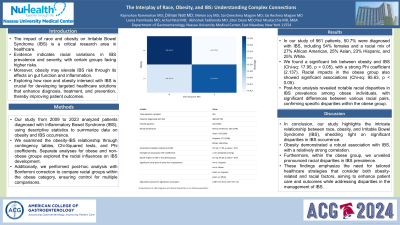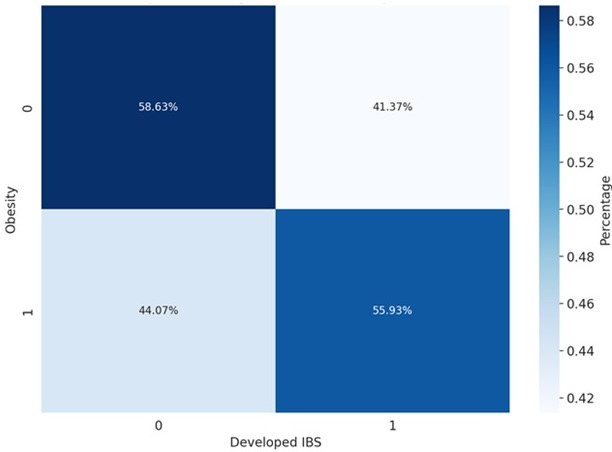Sunday Poster Session
Category: Obesity
P1441 - The Interplay of Race, Obesity, and IBS: Understanding Complex Connections
Sunday, October 27, 2024
3:30 PM - 7:00 PM ET
Location: Exhibit Hall E

- RR
Rajmohan Rammohan, MD
Nassau University Medical Center
East Meadow, NY
Presenting Author(s)
Raj Mohan Ram Mohan, MD, Sai Reshma Magam, MD, Sai Greeshma Magam, MD, Melvin Joy, MD, Dilman Natt, MD, Leeza Pannikodu, MD, Winghang Lau, MD, Abhishek Tadikonda, MD, Jiten Desai, MD, Krishnaiyer Subramani, MD, Paul Mustacchia, MD, MBA
Nassau University Medical Center, East Meadow, NY
Introduction: The impact of race and obesity on Irritable Bowel Syndrome (IBS) is a critical research area in healthcare. Evidence indicates racial variations in IBS prevalence and severity, with certain groups facing higher risks. Moreover, obesity may elevate IBS risk through its effects on gut function and inflammation. Exploring how race and obesity intersect with IBS is crucial for developing targeted healthcare solutions that enhance diagnosis, treatment, and prevention, thereby improving patient outcomes.
Methods: Our study from 2009 to 2023 analyzed patients diagnosed with Inflammatory Bowel Syndrome (IBS), using descriptive statistics to summarize data on obesity and IBS occurrence. We examined the obesity-IBS relationship through contingency tables, Chi-Squared tests, and Phi coefficients. Separate analyses for obese and non-obese groups explored the racial influences on IBS development. Additionally, we performed post-hoc analysis with Bonferroni correction to compare racial groups within the obese category, ensuring control for multiple comparisons.
Results: In our study of 961 patients, 50.7% were diagnosed with IBS, including 54% females and a racial mix of 27% African American, 25% Asian, 23% Hispanic, and 25% White. We found a significant link between obesity and IBS (Chi-sq: 17.95, p < 0.05), with a strong Phi coefficient (2.137). Racial impacts in the obese group also showed significant associations (Chi-sq: 95.63, p < 0.05). Post-hoc analysis revealed notable racial disparities in IBS prevalence among obese individuals, with significant differences between various racial pairs, confirming specific disparities within the obese group.
Discussion: In conclusion, our study highlights the intricate relationship between race, obesity, and Irritable Bowel Syndrome (IBS), shedding light on significant disparities in IBS occurrence. Obesity demonstrated a robust association with IBS, with a relatively strong correlation. Furthermore, within the obese group, we unveiled pronounced racial disparities in IBS prevalence. These findings emphasize the need for tailored healthcare strategies that consider both obesity-related and racial factors, aiming to enhance patient care and outcomes while addressing disparities in the management of IBS

Note: The table for this abstract can be viewed in the ePoster Gallery section of the ACG 2024 ePoster Site or in The American Journal of Gastroenterology's abstract supplement issue, both of which will be available starting October 27, 2024.
Disclosures:
Raj Mohan Ram Mohan, MD, Sai Reshma Magam, MD, Sai Greeshma Magam, MD, Melvin Joy, MD, Dilman Natt, MD, Leeza Pannikodu, MD, Winghang Lau, MD, Abhishek Tadikonda, MD, Jiten Desai, MD, Krishnaiyer Subramani, MD, Paul Mustacchia, MD, MBA. P1441 - The Interplay of Race, Obesity, and IBS: Understanding Complex Connections, ACG 2024 Annual Scientific Meeting Abstracts. Philadelphia, PA: American College of Gastroenterology.
Nassau University Medical Center, East Meadow, NY
Introduction: The impact of race and obesity on Irritable Bowel Syndrome (IBS) is a critical research area in healthcare. Evidence indicates racial variations in IBS prevalence and severity, with certain groups facing higher risks. Moreover, obesity may elevate IBS risk through its effects on gut function and inflammation. Exploring how race and obesity intersect with IBS is crucial for developing targeted healthcare solutions that enhance diagnosis, treatment, and prevention, thereby improving patient outcomes.
Methods: Our study from 2009 to 2023 analyzed patients diagnosed with Inflammatory Bowel Syndrome (IBS), using descriptive statistics to summarize data on obesity and IBS occurrence. We examined the obesity-IBS relationship through contingency tables, Chi-Squared tests, and Phi coefficients. Separate analyses for obese and non-obese groups explored the racial influences on IBS development. Additionally, we performed post-hoc analysis with Bonferroni correction to compare racial groups within the obese category, ensuring control for multiple comparisons.
Results: In our study of 961 patients, 50.7% were diagnosed with IBS, including 54% females and a racial mix of 27% African American, 25% Asian, 23% Hispanic, and 25% White. We found a significant link between obesity and IBS (Chi-sq: 17.95, p < 0.05), with a strong Phi coefficient (2.137). Racial impacts in the obese group also showed significant associations (Chi-sq: 95.63, p < 0.05). Post-hoc analysis revealed notable racial disparities in IBS prevalence among obese individuals, with significant differences between various racial pairs, confirming specific disparities within the obese group.
Discussion: In conclusion, our study highlights the intricate relationship between race, obesity, and Irritable Bowel Syndrome (IBS), shedding light on significant disparities in IBS occurrence. Obesity demonstrated a robust association with IBS, with a relatively strong correlation. Furthermore, within the obese group, we unveiled pronounced racial disparities in IBS prevalence. These findings emphasize the need for tailored healthcare strategies that consider both obesity-related and racial factors, aiming to enhance patient care and outcomes while addressing disparities in the management of IBS

Figure: Race, Obesity and Inflammatory Bowel Syndrome
Note: The table for this abstract can be viewed in the ePoster Gallery section of the ACG 2024 ePoster Site or in The American Journal of Gastroenterology's abstract supplement issue, both of which will be available starting October 27, 2024.
Disclosures:
Raj Mohan Ram Mohan indicated no relevant financial relationships.
Sai Reshma Magam indicated no relevant financial relationships.
Sai Greeshma Magam indicated no relevant financial relationships.
Melvin Joy indicated no relevant financial relationships.
Dilman Natt indicated no relevant financial relationships.
Leeza Pannikodu indicated no relevant financial relationships.
Winghang Lau indicated no relevant financial relationships.
Abhishek Tadikonda indicated no relevant financial relationships.
Jiten Desai indicated no relevant financial relationships.
Krishnaiyer Subramani indicated no relevant financial relationships.
Paul Mustacchia indicated no relevant financial relationships.
Raj Mohan Ram Mohan, MD, Sai Reshma Magam, MD, Sai Greeshma Magam, MD, Melvin Joy, MD, Dilman Natt, MD, Leeza Pannikodu, MD, Winghang Lau, MD, Abhishek Tadikonda, MD, Jiten Desai, MD, Krishnaiyer Subramani, MD, Paul Mustacchia, MD, MBA. P1441 - The Interplay of Race, Obesity, and IBS: Understanding Complex Connections, ACG 2024 Annual Scientific Meeting Abstracts. Philadelphia, PA: American College of Gastroenterology.
